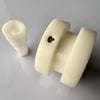Nylon gaskets and seals are found in a wide range of applications, providing reliable sealing across industries from automotive to plumbing and beyond. With excellent chemical resistance and durability over a wide temperature range, nylon has become a popular gasketing material where reliability and performance are critical.
🎉🎉🎉Limited Time Offer Use code: QR4GNY08SHVR at checkout and enjoy a special discount on your entire order! 👉 Nylon plastic

What Are Nylon Gaskets and Seals?
Nylon gaskets and seals are sealing products constructed out of nylon plastic polymer. Nylon is one of the most commonly used engineering thermoplastics due to its favorable combination of properties. Some key attributes that make nylon a top choice for gasketing and sealing applications include:
- High strength and stiffness
- Resistance to gasoline, oil, and other chemicals
- Ability to perform through a wide temperature range from -40°F to over 200°F
- Good abrasion and wear resistance
Nylon gaskets and seals are available in a variety of stock shapes and sizes, such as nylon o-rings, nylon washers, nylon spacers, and custom nylon gaskets. They are commonly produced in nylon 6/6, a widely used type of nylon that offers a robust combination of mechanical properties, chemical resistance, and heat resistance.

Nylon Gaskets & Seals for Automotive Engines
In automotive applications, nylon gaskets and seals are found throughout the engine to contain fluids and lubricants. Common examples include:
Nylon Oil Pan Gaskets
The oil pan on the bottom of the engine block uses a gasket to seal the joint between the oil pan and engine. Nylon gaskets are a popular choice as they withstand engine oil temperatures while providing a tight seal. Nylon's ability to conform to uneven surfaces improves sealing reliability.
Nylon Valve Cover Gaskets
The valve cover encloses the camshaft and valves. Nylon valve cover gaskets maintain a seal against hot engine oils. Nylon's high heat resistance prevents common gasket failures.
Nylon Intake Manifold Gaskets
These nylon gaskets seal the interface between cylinder head and intake manifold. Nylon withstands coolant temperatures while resisting degradation.
Nylon engine gaskets maintain strong seals to keep oil, coolant and combustion gases contained even through extreme temperature swings under the hood. Nylon's design flexibility allows cost-effective gaskets tailored to complex part geometries.

Keeping It Sealed: Nylon Gaskets in Plumbing
In plumbing systems, nylon gaskets and o-rings provide reliable sealing for pipe connections and joints.
Nylon O-Rings
Nylon o-rings are commonly used as gaskets between pipe fittings, valves, and connections. Nylon's excellent chemical resistance enables sealing performance against aggressive cleaning agents and diluted acids/alkalis used in plumbing.
Nylon Pipe Washers
Nylon washers placed between pipe joints create a tight seal. Nylon washers maintain their sealing properties even when exposed to moisture and water for extended periods, unlike some other plastic materials.
Resilient, Anti-Corrosive Sealing
Overall, nylon plumbing gaskets withstand chemical exposure that causes natural rubber seals to degrade over time. Unlike metal gaskets, nylon plastic seals resist corrosion. This provides long-lasting sealing reliability.
Protecting Sensitive Electronics with Nylon Enclosures
Electronics enclosures and housings commonly use nylon seals to protect internal components from the elements.
Nylon Lid Seals
Nylon seals around lids and access panels keep dust and debris out of enclosures. Nylon's inherent lubricity allows repeated disassembly/reassembly while maintaining a tight seal.
Resilient Sealing Through Temperature Changes
Nylon gaskets maintain sealing through the temperature fluctuations that electronics can experience during operation and storage. Nylon's resilience allows the seal to stay intact where rigid plastics may fail.
Effective Moisture Protection
Nylon o-rings around enclosures keep sensitive electronics dry. Nylon provides an economical sealing option vs expensive rubber gaskets for moisture protection.
Nylon's chemical resistance also prevents seal degradation from common industrial fumes and vapors for electronics used in harsh environments.

Keeping Furniture Secure with Nylon Washers
Furniture manufacturers take advantage of nylon's vibration resistance, stiffness, and lubricity to prevent loosening.
Leveling Feet
Nylon washers placed under screw-in leveling feet for tables, chairs, and shelving units help maintain proper furniture stability. Nylon prevents the feet from loosening over time from small vibrations.
Handles and Pulls
Nylon spacers and washers behind handles and pulls allow smooth operation while preventing wobble and loosening. Nylon washers reduce wear between hardware and furniture material.
Eliminating Squeaks and Wobbles
Nylon washers installed during furniture assembly also eliminate squeaks and wobbles by reducing friction between joining parts. The result is sturdy furniture that remains tightly assembled over years of use.
Why Choose Nylon Over Rubber and Metal?
Nylon offers significant advantages over other popular gasket and seal materials like rubber and metal.
Temperature Resistance
Nylon retains sealing capabilities across a broader temperature range than rubber gaskets. Nylon maintains flexibility and resiliency from sub-zero temperatures up to over 200°F.
Chemical Resistance
Nylon washers, gaskets and o-rings resist chemical exposure that causes rubber seals to degrade over time. Nylon's inert plastic material is unaffected by oil, fuels, cleaners, or diluted acids/alkalis.
Corrosion Resistant
Unlike metal gaskets, nylon plastic seals will not corrode when exposed to moisture. Nylon spacers maintain stable dimensions and sealing properties over the long term.
Cost Effective
Nylon is an economical alternative to high-performance metals or specialty rubbers. It allows cost-effective seals tailored to applications from automotive engines to electronics.
Design Flexibility
Nylon's excellent machinability and ability to mold into custom shapes allows gaskets tailored to complex joint geometries. Nylon materials can be blended for application-specific properties.
Conclusion
With its outstanding sealing capabilities across a wide temperature and chemical range, nylon has become ubiquitous as a gasket, o-ring, and washer material where reliability is critical. Nylon gaskets and seals enable optimal performance and safety in automotive engines, plumbing systems, sensitive electronics, assembled furniture, and more. For the best combination of economy, flexibility, and resilience - consider nylon for your next gasketing application.







